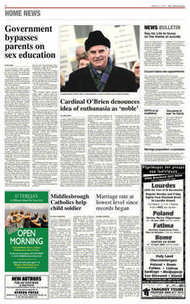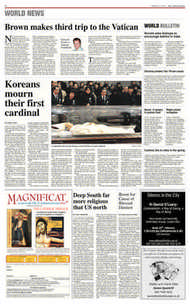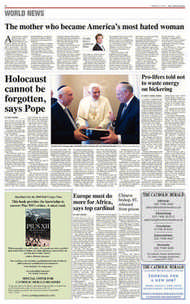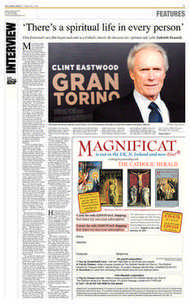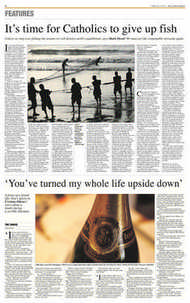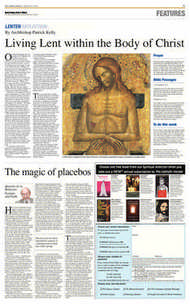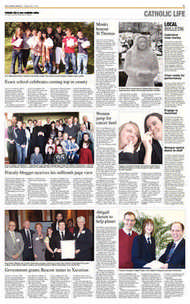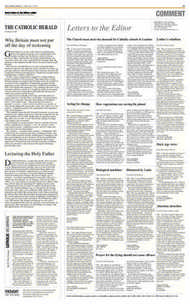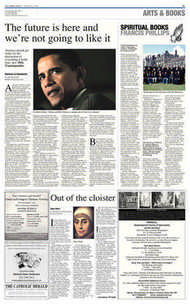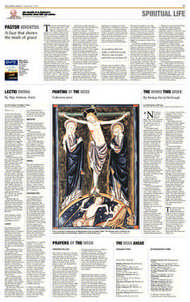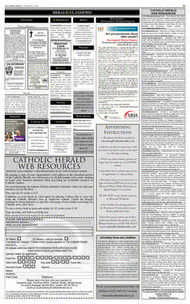Page 12, 20th February 2009
Page 12

Report an error
Noticed an error on this page?If you've noticed an error in this article please click here to report it.
Tags
Share
Related articles
Fairtrade Helps Consumers Make A Real Difference To The...
The Ethical Caffeine High
Privatisation Of A King's Conviction
Church Is Alarmed By New Code For Teachers
Europe
Don’t bully the faithful into buying Fairtrade
It is a curious aspect of the Catholic Church in England and Wales that those who wish there to be the maximum room for personal judgment and discretion on matters of faith and morals are also the most keen to promote narrow, prescriptive edicts to the faithful on other matters.
While all must take the Church’s social teaching very seriously, by undertaking good works, making real sacrifices to meet charitable obligations and always treating people justly, the Church asks Catholics to make personal, prudential judgments about the detail of such matters. But, according to some, this opportunity for judgment does not stretch to the choice of whether to buy Fairtrade products. The purchase of Fairtrade products is often promoted as an obligation. The purchase of non-Fairtrade products has been described by one priest as a sin worse than theft and by another as a deliberate choice to take from the poor.
Furthermore, this supposed obligation of Catholics to buy Fairtrade products is generally extended to a requirement to buy Fairtrade products with a capital F. In other words, products that are certified by a body called the Fairtrade Labelling Organisation and approved by the Fairtrade Foundation – and often sold, at least in churches and schools, by a commercial organisation called Traidcraft. As Arundel and Brighton’s diocesan website puts it: “If it doesn’t say Fairtrade, it isn’t Fairtrade! Fairtrade status is only granted by the trade body, The Fairtrade Foundation.” The rigour of the checks that the Fairtrade Labelling Organisation makes on behalf of the Foundation has been questioned, but we will leave that aside for now.
The Fairtrade Labelling Organisation does not have a monopoly of virtue. In fact, there is a healthy market in products that have similar attributes to “officially labelled” products. Afghan Action, for example, is a model company in the ethical market, working in the most challenging conditions imaginable – perhaps too challenging for the Fairtrade Labelling Organisation. It provides extremely good conditions of work for its employees and overcomes numerous challenges to import its products through a suspicious customs service.
The experience of Union Coffee is equally telling. Union Coffee has impeccable ethical standards – often considerably better than those required by Fairtadelabelled products. Though Union Coffee does sell some Fairtrade-labelled coffee, much of its business simply does not fit into the Fairtrade business model which has a number of specific requirements and limitations.
These examples, and many others, should give Fairtrade proponents pause for thought, as should the requirements for Fairtrade status in schools. To obtain Fairtrade status, not only do Fairtrade products have to take pride of place in school, but Fairtrade “education” has to be rolled out in the curriculum too.
This is not education in the Newman sense of the word. One recent homework that I came across involved children cutting and pasting slogans from Traidcraft’s website on to an advertising poster for Fairtrade products. One of the propositions that students are supposed to assent to (or dissent from) to test whether they have learnt about Fairtrade is: “I don’t think it’s fair that rich countries decide what farmers in poor countries get for their products.” This statement is simply false. Fairtrade proponents might not like certain aspects of the way markets for primary products work, but it is demonstrably and objectively false that rich countries set the prices that farmers in poor countries receive for their products. Coffee prices more than doubled between 2005 and 2008 and have since slipped back about 20 per cent. Neither the rise nor the fall was “decided” by rich countries. To suggest that it was is the antithesis of education.
Those who promote Fairtrade tend to get trapped in the slipstream of particular organisations. But what of the whole idea of fair trading (with a small F and small T)?
The most attractive argument for Christians in favour of buying fair trade products is that it ensures that a just price is paid. As the phrase goes, “it is justice, not charity”. This claim deserves serious thought. The just price in Christian tradition, certainly since Thomas Aquinas, has generally been regarded as the agreed market price – though there are important exceptions. Fair trade’s strongest card is that it goes into markets where there is little information, where primary producers can be, and often are, exploited and makes sure that they get a just, market price. It also provides sources of credit and forward-pricing agreements that might not be available otherwise.
But the reality is that there are many ways in which a just price, properly understood, can be paid to growers. In fact, multinationals generally offer better working conditions than indigenous employers in the under-developed world: Fairtrade makes much mileage by generalising from particular examples of abuse. Many producers make forms of coffee for which the Fairtrade model is wholly inappropriate. Many poor producers may not wish to pay the considerable Fairtrade registration fees – and there is no reason why they should feel obliged to do so to get the custom of Christian buyers in the West.
A just price is not, as Fairtrade proponents suggest, whatever price is necessary to provide somebody with the means to continue in their current business. The socalled “social premium” is a form of chari table assistance to people who happen to produce particular goods that we choose to buy. It is not necessarily efficient or well targeted. And many of the other mark-ups that we see on Fairtrade products simply never find their way back to the growers at all, something that has caused legitimate concern. Ultimately, poor producers of primary products need wider and better economic opportunities that can only come from development based on the rule of law, secure property rights and a free economy. To use an in-vogue phrase, Fairtrade is not a sustainable model of development.
Some of the political campaigns of the Fairtrade Foundation – though certainly not its well-judged campaign against cotton subsidies – might well, if they were successful, damage free trade and harm the world’s poorest people. But we should not pit “fair trade” against “free trade”. Fair trade arises from the free choices of individuals. There is no free market case against fair trade, as is sometimes suggested, but there are pragmatic reasons to think twice before being caught up in the slipstream of this movement.
The Fairtrade mark is, of course, a great marketing coup. Who wants to be seen as “unfair”? But to imply that free transactions are not fair unless they are stamped and certified by one particular organisation is wrong. Consumers should think carefully. The term “prudential personal judgment” could have been invented to describe the decision whether to buy fair Fairtrade products.
Professor Philip Booth is the editorial and programme director of the Institute of Economic Affairs. Fairtrade Fortnight runs from February 23 to March 8. For information, visit www.fairtrade.org.uk
blog comments powered by Disqus



